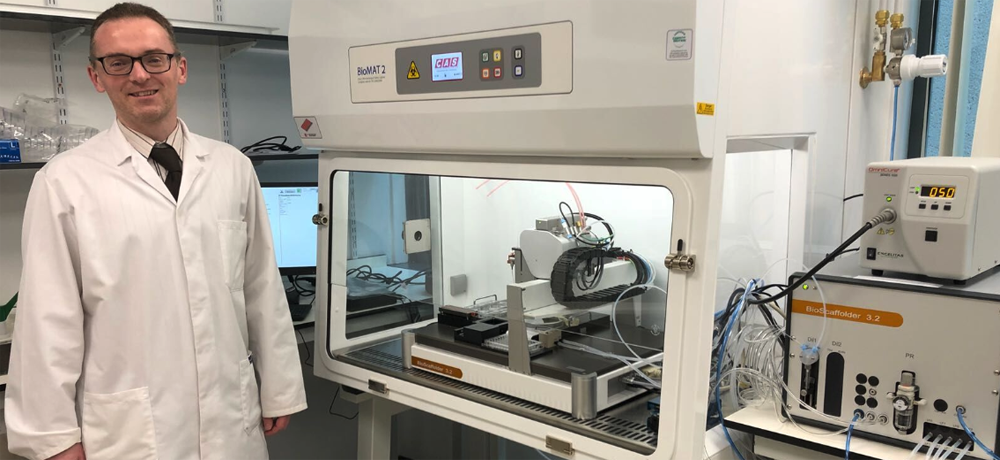Queen’s University Belfast Sees Installation of 3D Bioprinter

Analytik, a company that provides cutting-edge scientific instrumentation, has announced the recent installation of GeSiM 3D bioprinter at Queen’s University Belfast. It will be used in the development of new processes including the manufacture of medical and drug delivery devices. The company claim, ‘L3D printing could revolutionise personalised medicine’ by creating complex devices tailored to the individual patient through precise control of device geometry, materials and internal architecture. Instrumentation such as the family of modern 3D printers from GeSiM are being used to advance the development of new biodevices. The GeSiM BioScaffolder 3.2 is a flexible 3D bioprinter with a unique piezoelectric micro-pipetting system for pico- and nano-litre spotting of cells and biomolecules, as well as pneumatically-actuated cartridges for precise printing of highly viscous materials (e.g. molten thermoplastic polymers) on definable coordinates within a scaffold structure or on flat surfaces. This combination of both technologies is unique and not available on competitor 3D printers. The BioScaffolder can print polymers at temperatures up to 250 °C, while cells and biomolecules (e.g. enzymes, proteins) can be maintained at 37 °C or chilled to enhance stability. This innovative approach allows struts of mechanically-stiff materials to be combined with cell-friendly materials (e.g. hydrogels) containing suspended cells in novel regenerative medicine approaches. The instrument automatically aligns print tools of different dimensions by means of a 3-axis light barrier. Struts of up to three different materials can be combined, even in a single layer. Individual cells, cell suspensions and aqueous polymer solutions can be printed onto substrates for applications in single-cell analyses, biosensing and drug delivery. Importantly, the BioScaffolder can be interfaced with existing analytical equipment, with individual cells or minute-volume solutions accurately printed directly into multi-well plates, or onto microfluidic chips or biosensor substrates. GeSiM have recently added melt electrospinning for fibre production and UV-curing capabilities, while a new core-shell tool allows precise printing of tubes, with either a hollow bore or soft internal material, further extending utility. Professor Ryan Donnelly holds the Chair in Pharmaceutical Technology in the School of Pharmacy at Queen’s University Belfast. His research is focused on the design and physicochemical characterisation of advanced polymeric drug delivery systems for transdermal and topical applications. He describes the plans for his recently installed bioprinter which was funded by a Wellcome Trust Multi-use Equipment grant. “Our overall aim is to, for the first time, extend the utility of 3D bioprinting from applications in regenerative medicine into reproducible manufacture of micron-scale drug delivery devices, biosensor production, single cell analyses and enhanced understanding of tumour microenvironments. These novel uses of 3D bioprinting have the potential to make a significant and far-reaching impact, in improving health and therapeutic outcomes for patients. “This is the first 3D bioprinter in our university and, to our knowledge, is the first instrument with the unique capabilities of the BioScaffolder in Ireland. Together with my colleagues, we plan to follow the Wellcome Trust’s strategy on improving health for all, in that it will accelerate the application of research to improve health and drive forward development of new healthcare products, devices and technologies and promote clinical translation of research advances from bench to clinic.” Product Specialist, Hiran Vegad, says, “Working with Professor Donnelly and his group at Queen’s is already proving extremely exciting. Their broad focus will impact on the prevention of disease, antimicrobial resistance, improved diagnoses, better treatments and enhancing understanding of cancer and inflammatory diseases to the benefit of patients worldwide. As suppliers, we at Analytik look forward to playing an active role in this program over the coming years.” Manufacturing & Engineering Magazine | The Home of Manufacturing Industry News


